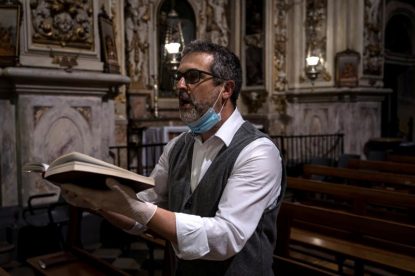
A choir singer gives a solo performance in an empty church during a Mass via livestream in San Fiorano, Italy, May 6, 2020, during the COVID-19 pandemic. (CNS photo/Marzio Toniolo via Reuters)
ROME (CNS) — The Italian bishops and government have agreed on a protocol to allow the public to be present for liturgical celebrations starting May 18.
In an effort to avoid spreading the coronavirus, a series of restrictions will be in force, such as wearing facial masks inside the church, social distancing between individuals and no choir being present.
People also are asked not to go to church if they are showing flu-like symptoms, have a temperature above 37.5 degrees Celsius (99.5 F), or know they have been in contact with someone who has recently tested positive for the coronavirus.
[hotblock]
The protocol, which was signed May 7, specifies the guidelines each church and the faithful will have to follow in order to help safeguard public health, the Italian bishops’ conference said in a statement on its website.
The agreement came as a result of “deep collaboration and synergy between the government, the technical-scientific committee and the bishops,” said Cardinal Gualtiero Bassetti of Perugia, president of the Italian bishops’ conference, adding that the church was committed to helping end the COVID-19 crisis.
Italian Prime Minister Giuseppe Conte said the procedures and restrictions outlined in the protocol are meant to ensure the public could once again attend liturgical celebrations with the utmost safety.
“I thank the bishops for the moral and material support that they are giving the entire nation in this difficult moment for the country,” he added.
In order to allow the faithful to attend a liturgical celebration in a place of worship, a number of norms would have to be respected, including: wearing a facial mask; avoiding any form of assembly throughout the structure; limiting the number of people inside so that each person can maintain a five-foot distance from each other; and having special entrances and sections inside for differently abled people.
During the phase of gradual reopening, it called for volunteers with protective personal equipment to stand at the entrances to supervise adherence to the norms, to leave doors open so people don’t have to touch handles and to provide hand sanitizing gel at the entrance. If there is not enough room inside the church for those who wish to attend a Mass, it asked the church to consider offering more daily services.
The church and objects inside would have to be sanitized after each celebration and rooms be aired out where possible. Holy water fonts must remain empty, it added.
There also should be a limited number of concelebrants and other ministers so that social distancing can be guaranteed and, while there can be an organist, there should be no choir during this phase of reopening, it said.
Exchanging the sign of peace should be omitted and Communion should be distributed in the hand only and only by ministers who have properly sanitized their hands, put on disposable gloves and are wearing a mask. The priest or eucharistic minister must offer the consecrated host without having contact with the hands of the faithful.
The collection basket should not be passed around during the celebration but be kept in one fixed spot deemed to be appropriate.
The sacrament of penance should be administered in an open, ventilated location, and both priest and penitent must wear masks and keep a five-foot distance while ensuring a sense of privacy.
The norms apply to all liturgical celebrations including marriages, funeral Masses, baptisms and the anointing of the sick. The last two require the minister to wear a mask and disposable gloves.
For now, the celebration of the sacrament of confirmation is to be postponed.
Signs should be put up at the church entrance indicating the required public health norms, the maximum number of faithful allowed inside at a time and that access is forbidden to those with flu-like symptoms, fever or known contact with someone testing positive for coronavirus.
The protocol suggested outdoor Masses be considered and encouraged the ongoing livestreaming of Masses for those who cannot participate.
PREVIOUS: Constant emergencies: Despite pandemic, millions live on the run
NEXT: On anniversary of Nazi surrender, German Catholics’ suffering recalled



Share this story